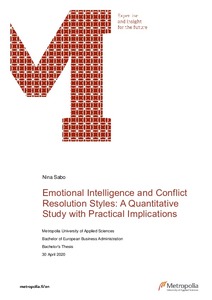Emotional Intelligence and Conflict Resolution Styles: A Quantitative Study with Practical Implications
Sabo, Nina (2020)
Sabo, Nina
2020
All rights reserved. This publication is copyrighted. You may download, display and print it for Your own personal use. Commercial use is prohibited.
Julkaisun pysyvä osoite on
https://urn.fi/URN:NBN:fi:amk-2020051511593
https://urn.fi/URN:NBN:fi:amk-2020051511593
Tiivistelmä
The purpose of the present study was to examine the link between emotional intelligence (EI) and the various conflict resolution styles (CRSs). Using Schutte et al.’s (1998: 167-177) self-report measurement and Thomas & Kilmann’s (Kilmann & Thomas 1977: 309-325) MODE instrument, emotional intelligence and the preferred conflict resolution style (CRS) of the participants were measured in an online survey. The sample comprised 104 German students with a specialization in business whose average age was 22.2 years. The results of the ANOVA test showed that there was a significant correlation between the preferred style of avoiding and low EI values and that there was no significant correlation between emotional intelligence and the styles of accommodating, collaborating, compromising, or competing. However, there were indications for connections between high values in emotional intelligence and the styles of compromising and collaborating as well as low values in EI and the style of competing which were found using multiple regression. In addition, implications, limitations and further directions were addressed.
